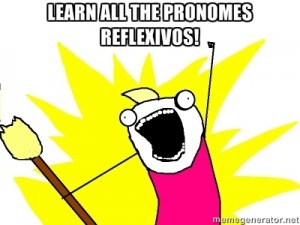Oi gente, tudo bom?
Using the pronomes reflexivos reflexive pronouns in Portuguese is easier than you think. They are used when the subject and the object are the same.

Sujeito (subject) + me/se/nos/te + verbo
Eu me
Você se / Tu te
Ele se
Nós nos
Vocês se
Eles se
Como usá-los (how to use them):
In order not to repeat the sujeito, you use the pronome reflexivo:
- Maria machucou Maria. Maria hurt Maria. (sujeito e objeto are the same: Maria)
Becomes:
- Maria se machucou. Maria hurt herself. (Use reflexive “se” i.e. Ela se)
This is why we say “Eu me chamo…”. It translates literally as “I call myself…” and it is one of the ways of asking someone’s name or telling people your name. Exemplo: Como você se chama? Eu me chamo Ester.
Outros exemplos:
-
Se cortar – to cut yourself
Eu me cortei acidentalmente. I accidently cut myself.
-
Se sujar – to get yourself dirty with something
Lorena se sujou de farinha preparando o bolo. Lorena got flour on herself when preparing the cake.
-
Se divertir – to enjoy yourself
Eu e minha amiga nos divertimos na festa. My friend and I enjoyed ourselves at the party.
-
Se inscrever – to sign up for
Joana se inscreveu para o curso. Joana signed up for the course.
-
Se maquear – to put on make-up
Eu me maqueei para a festa. I put on make-up for the party.
-
Se vestir – to dress yourself
Bernardo and Victor se vestiram de palhaço. Bernardo and Victor dressed up as clowns.
-
Se valorizar – to value yourself
João não se valoriza. João does not value himself.
-
Se atrasar – to be late.
Eu e meu amigo nos atrasamos para o trabalho. My friend and I were late to work.
Expressions using reflexive pronouns:
-
Se fazer de bobo – bobo translates as silly. However, in this case it means something different: to pretend you did not understand something/a situation.
Ela insultou o garçon, mas ele se fez de bobo. She insulted the waiter, but he pretended he didn’t understand.
Não se faça de bobo, eu sei que você acompanhou a conversa. Don’t pretend you didn’t understand. I know you followed the conversation.
-
Se matar de + verbo – se matar translates as to kill yourself. In this context, however, it means doing a lot of something, sometimes more than you should. To tire yourself by doing an activity excessively.
Marcela se matou de estudar. Marcela studied a lot (meaning she is tired from studying, she studied too much).
Kira e eu nos matamos de trabalhar. Kira and I worked a lot (meaning we are tired from working, we worked too much).
As crianças se mataram de comer chocolate na páscoa. The kids ate too much chocolate at Easter.
Os atletas se mataram de malhar na academia. The athletes worked out a lot in the gym (meaning they are tired from working out).
Eu me matei de ver televisão. I watched too much television.





